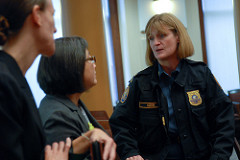
(Photos © J. Maus)
Today, the Portland City Council unanimously approved the Transportation Community Policing Agreement.
At yesterday’s Council meeting, the four City Commissioners (Mayor Adams is away) heard testimony from traffic safety advocates and representatives from the Police Bureau and the Bureau of Transportation (PBOT). There was also a screening of the bicycle traffic enforcement training video released last week.
Before the meeting, I sat down with Susie Kubota outside Council Chambers. Kubota is the aunt of Tracey Sparling, 19-year former art student who died on October 11, 2007 after being right-hooked by a garbage truck in downtown Portland. Sparling’s death, and the death of Brett Jarolimek 11 days later and a serious injury collision at the same location just two weeks after that, were the catalysts for this agreement.
“Yes, it’s empowering, I feel like I’ve been heard.”
— Susie Kubota, aunt of Tracey Sparling
Kubota said her experience of the last two years is a great example of how one person can make a difference. “Yes, it’s empowering, I feel like I’ve been heard.” Kubota said she jumped at the chance to express her gratitude. “Once I heard about this agreement coming to City Council, I thought it was a good opportunity for me to thank the City and the Police Department.”
But Kubota isn’t about to relax. She said this is a beginning, not an end, and that the agreement is just a promise, “and promises aren’t necessarily always met.” She then added, “I just want to make sure they stand by this proposal. It’s just a proposal, but it shows good intentions.”
Kubota also shared something she feels is missing from both the agreement and the bike traffic enforcement video: “One thing I think it’s left out is the automobile education part of it. The police video is great, but it’s focused on cyclists, and there’s a heck of a lot of education that needs to occur with drivers.”
“Sometimes it takes a tragedy to bring everyone together. There was so much pain, so much frustration, but really, we weren’t that far apart.”
— Portland Police Chief Rosie Sizer
Once the Council meeting got underway, as expected, everyone in attendance praised the partnerships and spirit of collaboration that have led to the creation of the video, the Community Policing Agreement, and the myriad other initiatives that have taken place in the past two years.
Acting Captain of the Police Bureau Traffic Division Bryan Parman was first to testify. Here’s a snip from what he said:
“Overall, we all want the same thing. Each of us is here today because we want our transportation system to be safe and comfortable to use regardless of the mode of transportation you choose. This CPA will formalize our partnership and set forth a process for identifying areas in our system that have the greatest needs for improvement.”
Greg Raisman, a traffic safety specialist with PBOT, pointed out how Portland’s traffic injury and fatality numbers are on a 22-year downward trend, saying, “It’s through these type of community partnerships that we’re able to really push the bar as to how safe we’re able to make our neighborhoods.”
Susie Kubota testified next. After Sparling’s death, Kubota publicly criticized the Police Bureau for their insensitive remarks and their handling of the situation. But today, she had much kinder words, saying that, “In the aftermath in the tragic events of that year, we have seen a remarkable change in the Bureau’s approach under Chief Sizer’s leadership.”
As each Commissioner gave their vote and shared remarks, Commissioner Saltzman (who’s also the Police Commissioner) shared his perspective on bike safety. “I don’t feel safe biking on city streets… but I think this framework of this agreement is what we need to get to that next level.”
After the meeting got underway, Police Chief Rosie Sizer walked in and sat quietly in the back row; just like she did on November 17th, 2007, when she attended the the “We Are All Traffic” rally off duty, in her civilian clothes.
Since those tragic events, Sizer has presided over a sea change in how the Police Bureau communicates, interacts, and works with the City and the community on bicycle-related issues.
It’s becoming quite clear that the reason for this sea change, as was directly noted in the new bike enforcement training video, is the transition in Portland from the old “outlaw edginess” (read: Critical Mass) of the past and the new, mainstream style of advocacy and activism that has taken it’s place.
I spoke with Sizer after the meeting. She said this new tone from bike advocates is what has made it possible for her and her staff to come to the table and work productively on bike traffic issues. Chief Sizer also acknowledged that the tragedy and outrage experienced by the community in October 2007 is what forced them to make these changes.
“Sometimes it takes a tragedy to bring everyone together. There was so much pain, so much frustration, but really, we weren’t that far apart.”
Sizer said another key in moving the relationship forward was “widening the conversation outside of the Traffic Division and to others in the [Police] Bureau.” Those “others” came to the fore in the bike traffic enforcement training video. “Those officers in the video are peer leaders, so it’s been very well received.”
On the personnel note, I asked Sizer if a major shift in Traffic Division leadership she made just months after the events of October 2007, helped move the community relationship forward . She, as I expected, dodged the question. “I won’t comment on that, but I will say that [former Traffic Division Captain] Larry O’Dea’s collaborative approach, demeanor, and humbleness were very important in making this happen.”
— Download the Transportation Community Policing Agreement here (96kb PDF).

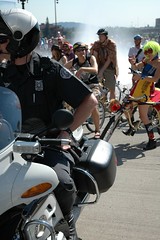
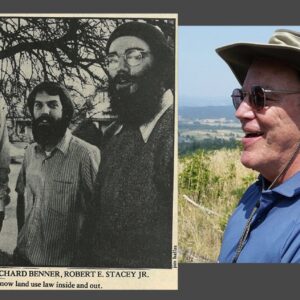

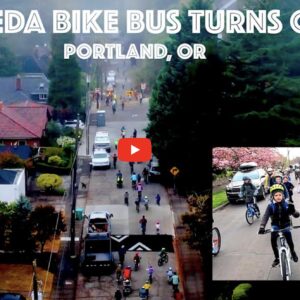
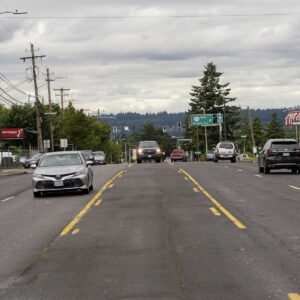
It is amazing how much can be done when advocates work with and–and not against–the system. Protests and acts of civil disobedience have their place, but as last resorts. Professional and rational social engagement produces the the greatest amount of long term positive change. Even if working with a system can be a mind numbing dry, and dare I say, boring, at times, it is still the best viable option to transition to a bike based transportation system.
Susie Kubota is exactly right about the lack of motorist education.
When are ODOT, PDOT and the DMV going to step up to the plate on this? We’ve been waiting for years already.
Is critical mass even going on anymore in Portland? A couple of years ago they frequently made the news.
As more people bike commute, cyclists will be accepted as more ‘normal’. I can’t wait for the day when car commuters are viewed as the weird ones…
RE: motor vehicle operator education.
Imagine if AAA or DMV was working as hard as bike advocates to improve traffic safety. Imagine what gains we could make if they were at the table with us as well.
I guess, since we’re the ones who are most vulnerable, we have more motivation to make things better… but It’s really too bad they don’t join in this effort.
I think someone in a position of leadership/power should strongly encourage/invite them to become signers of this agreement.
Mayor Adams or Chief Sizer perhaps should make a few phone calls.
Indeed, education, both at the time of licensure and ongoing, is necessary. Just today, a tradesman was in our house. The subjects of bikes and bike commuting came up. He asked me why bicyclists didn’t use the sidewalks and why did they ride in the street. It was as if he never learned that bicyclists have the same privileges and responsibilities as cars.
Actions speak louder than words.
Jonathan said “this new tone from bike advocates is what has made it possible for her and her staff to come to the table and work productively on bike traffic issues”
Marcus (#1) said “it is amazing how much can be done when advocates work with and–and not against–the system”
Agreed, but today’s advocacy would not have been possible without 4 preconditions:
First, the work of people like Mia Birk, Roger Geller, Greg Raisman, Jeff Smith, Linda Ginenthal and countless others at PBOT who paved the way (in some cases literally) for increased bike use.
Second, the BTA – both for suing the city early in their history, and for acting as mediator and the voice of reason during the transitionary period from activism to advocacy.
Third, Zoobomb and Critical Mass – Critical Mass forced the city to take cycling, and most importantly, CYCLISTS seriously. Before CM, there was no incentive for the city to seriously address the concerns of cyclists, and had Mia and the rest of PBOT been faced with determined opposition to their progressive planning, in the absence of CM it’s likely much of what we have now would not have happened. Likewise with Zoobomb. Zoobomb was instrumental in opening the dialog between the police and the bike fun community, and allowing the cooperation between police and non-traditional bike groups that led to a reduction in tensions between police and citizens and the extraordinary cooperation between Pedalpalooza organizers and the police bureau.
Finally, the Portland Police Bureau. I haven’t spoken personally with Chief Sizer, but I’ve said publicly on more than one occasion that the tone of the bureau is set at the top. I’ve had the honor and privilige this year to work with many of the top cops in the bureau: Commander Mike Reese, Captain Eric Hendriks (who is still in the hospital recovering from his recent tragic collision while off-duty), and Lieutenant Bryan Parman. Along with the long-standing stellar example of Officer Robert Pickett, these officers and those under their command have really made an effort to reach out to the community, and to focus on addressing real problems rather than nitpicking every little detail. The bureau allowed Pedalpalooza and the World Naked Bike Ride an extraorinary amount of latitude, and provided traffic management and protective services for that event.
Our advocacy today is possible because of the efforts of hundreds of people, not only because they chose to work together, but because the activists forced people to take cyclists seriously at a time when no one in the US outside of planners considered cycling to be a viable mode of transportation.
I think we’ve got something great here, and I have high hopes for further cooperation and collaboration with the city. But make no mistake, if advocacy no longer works well, the activism of the past will return. Citizens in Portland have a longstanding tradition of taking matters into their own hands when the city fails to address their needs, and they will again if it becomes necessary.
Matt,
I could not agree with you more.
I think it’s a shame if people forget that the reason the BTA, WPC, Police, PBOT came together WAS NOT by their own volition, but rather because their hand was forced due to outrage expressed by citizens that something must be done.
They’ve done great work together, but it’s citizen activism that forced the issue and it’s citizen activism that will continue to make sure these agreements and promises are kept.
An ecosystem without “outlaw edginess” is not a completely healthy one (a feeling I shared with O’Dea and Parman yesterday and I’m not sure how they took it 😉 ).
Amen. and Actions by cops speak louder than promises from Chiefs or City Hall.
Cops will still go to Lads circle and their favorite bike spots and write their full month quota of tickets in the name of schooling bikes, all places where no safety risk comes from the violation of a statute.
What never happens at numerous locations ( we all know them ) where CARS every 5 minutes BOTH break the fine print of the law and nearly kill pedestrians and bikes. Aka the cause of commissioner Saltsman to feel unsafe on a bike.
Why don’t the cops sting those locations?
The cycling community is honest and active about fixing our faults, but the real duty here is on PDOT and Street Cops to increase safety for bikes with occasional penalties for some cars. They may even get to their destination faster, because we already do when compared to other car only cities.
ps: Thank you officer Picket!
Say, while we’re on the subject, a reminder that We Are All Traffic, part of the collection of citizens that helped catalyze the Agreement(a collection which actually included WPC’s current Director, Jonathan #8) will be having a reunion party tomorrow, Sat. 17 October at 2pm at Ringler’s.
Was grateful (as always) to share a room with Susie and Erin yesterday. Thank you both.
Marcus (#1): “Protests and acts of civil disobedience have their place, but as last resorts”
When the bike community did not have a voice at the city level, the Critical Mass protests were the the best option. Now, that the city is listening to the bike community, it is our obligation to sit down at the table and work out differences.
I am glad that you brought up the personnel changes – seems like the ppb would be 100% better if a handful of changes like this were made.
going forward, I wonder when a good time would be to check in with these folks to see how the progress is on their agreed action items. until we see some action and results, this is a document that means very little.
@ jasmine #11 – The city is really only listening to a small but vocal portion of the bike community, those that want separated facilities like cycle tracks. This is the thrust of the proposed new Bike Master Plan.
We’ve still got a lot to lose as long as Oregon continues to have a mandatory bike lane and sidepath law – ORS 814.420 – on the books (and we are only one of a small handful of states with such a discriminatory law) – our rights as vehicle operators to use whatever portion of the roadway as necessary for our own safety.
BURR (#13) – The thrust of the Bike Master Plan is manifold, and a major focus is Bicycle Boulevards, which are NOT separated facilities.
The ORS 814.420 issue is irrelevant at the city level. Yes, it needs to be dealt with, but other than providing testimony to the state legislature, the City’s involvement is minimal at best.
I think that advocacy rather than activism is going to have better results towards eliminating ORS 814.420 – I certainly can’t see how a CM ride would encourage legislators to revoke or change the statute that keeps us in the bike lane, where we ostensibly can’t block “real traffic”.
Our best approach might be the courts. As operators of vehicles, we have a right to the streets – and ORS 814.420 deprives us of that right.
Thank You,
To those of you, who have passionately, lovingly, and reasonably, fought for solidarity, and basic safety rights. I sincerely appreciate, all the hard work, and love, that has been put into this project. You guys are my heros. xoxoxo
Matt #14 – sorry but I have to disagree that ORS 814.420 is irrelevant at the city level.
The City of Portland is installing these bike lanes and cycle tracks we are required by law to use, and Portland Police have been actively enforcing ORS 814.420.
The City of Portland can either actively lobby for repeal of ORS 814.420 in Salem, or not, depending on whether they want to allow cyclists the ability to ride outside the facilities they provide, or not.
Not lobbying for repeal of ORS 814.420 and actively ticketing cyclists for violations says volumes about the city’s attitude towards where they wish cyclists to be on the street.
In summary, ORS 814.420 represents a severe erosion of cyclists’ rights, which the city can either support or oppose, it’s that simple.
Well, we’ll have to agree to disagree then.
The City can’t do anything directly about ORS 814.420 – it has to be fought at the state level. Period. The City could lobby for that, but they won’t unless we as private citizens browbeat them into doing it. The police are going to support it because they are required to. City planners will continue to build the facilities because they increase ridership – the planning department doesn’t care whether we’re forced to use them or not.
It’s irrelevant at the city level because the city has no control over the decision. None. They have influence, sure, but so do you. So do business associations, neighborhood associations, other Oregon cities, the truckers, the unions, and any other organized group in Oregon.
ORS 814.420 *is* a serious erosion of cyclists’ rights – I even said so in my original post. Someone has to spearhead the effort to modify or overturn it. That someone will be a motivated citizen, not the city.
I’m inclined to spearhead this particular issue if I can clear my current obligations far enough in advance of the next legislative session.